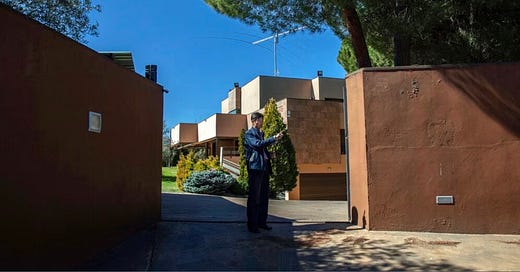NK closing embassies; Luxury goods to DPRK from China; Iran and Russia investing billions into parts of INSTC; Tehran and Baghdad want to use local currencies for trade
Prohibited Transactions for the week of 30 Oct 2023 (#26)
North Korea
North Korea is closing its embassies in Uganda, Angola, and Spain (pictured above), and its consulate in Hong Kong. These closures are reportedly due to financial difficulties faced by Pyongyang. A former North Korean diplomat stated that the closures could be a sign that Pyongyang is looking to pivot to Russia and the PRC, and no longer needs far-flung diplomatic missions to evade sanctions and raise funds. //I wonder the role that COVID-19 lockdowns may have played in Pyongyang’s thinking? If online illicit revenue generation could bring in more than people working out of embassies, Pyongyang would be freer to close down ones considered non-strategic. Pyongyang has had longstanding relations with Luanda and Kampala, going back to the Cold War. In more recent times, Angola had hosted approximately 1,000 North Korean workers (the most among African countries), and the DPRK has had an extensive training partnership with Uganda’s police and military forces.
The midterm 2023 UN Panel of Experts report has been released. //I usually jump to the appendices first when a new report comes out, since all the good stuff is there. Over the next few issues, I will highlight anything I find of particular interest. Otherwise, there are a number of articles which give a high level overview of what’s in the report.
PRC customs records reveal that North Korea imported USD2.3 million worth of wine and USD2.8 million worth of whiskey between January and September 2023, which would violate UN sanctions. //Though, as previously discussed, there is no standard definition for “luxury goods” so Chinese officials can likely just say the goods aren’t considered luxury by the government.
South Korea’s intelligence agency claimed to have gathered circumstantial evidence that Pyongyang is looking to assist the Palestinians, and could be attempting to use the war between Israel and HAMAS as an opportunity to sell weapons to terrorists or rouge states. Pyongyang may also use the war as a means to test its weapons and military tactics.
South Korea’s military assesses that the DPRK may have sent short-range ballistic missiles, portable anti-aircraft missiles, and artillery rounds to Russia as part of their recent agreements. North Korea may have already shipped 2,000 containers of military equipment to Russia, which is double previous estimates.
South Korean banks which were licensed to do business in North Korea — at the Kaesong Industrial Complex and Mount Geungang — have held onto those licenses, in the hopes of one day being able to establish branches in the North if relations improve.
A provincial bank in North Korea is offering new savings products as a way to entice the public to deposit “idle cash” into accounts. Customers could earn higher interest (between four and nine percent) and the accounts can be closed at any times. //Previous covert reporting from North Korea indicated that North Koreans have little trust in the country’s formal financial system, especially following the 2009 currency revaluation. North Korean policymakers have debated for years how “commercial banks” can function within a socialist planned economy.
Iran
Iran and Russia are likely to invest USD38 billion in the development of the Trans Caspian shipping lanes, as part of the International North-South Transport Corridor (INSTC).
Iran, along with Turkey, Turkmenistan, and Uzbekistan have signed an agreement to create a new transport corridor connecting the PRC with Europe.
Central Asian nations are actively working to strengthen existing transport corridors, and establish new ones, that would be able to carry sanctioned Russian goods. Tehran indirectly benefits as it has been doing its own outreach to neighboring countries about completing or building new routes that connect to and transit through Iran. //I haven’t been covering it too much in the newsletter, but it does feel over the past few months Iranian media has been highlighting the discussions and new agreements Tehran is engaging in regarding new roads or rail lines that are going both to the north and the east.
Iranian and Iraqi officials have emphasized the need to use national currencies when engaging in bilateral trades exchanges between the two countries.



